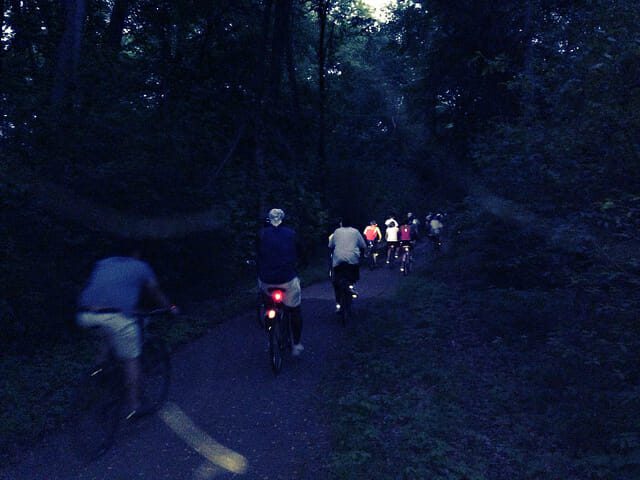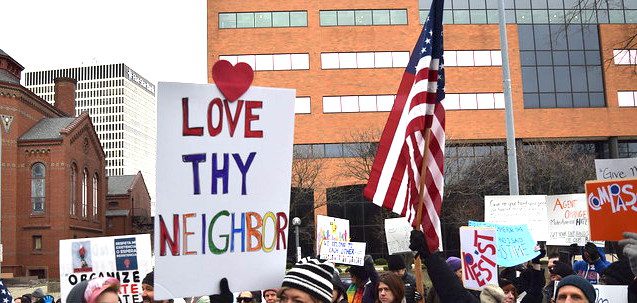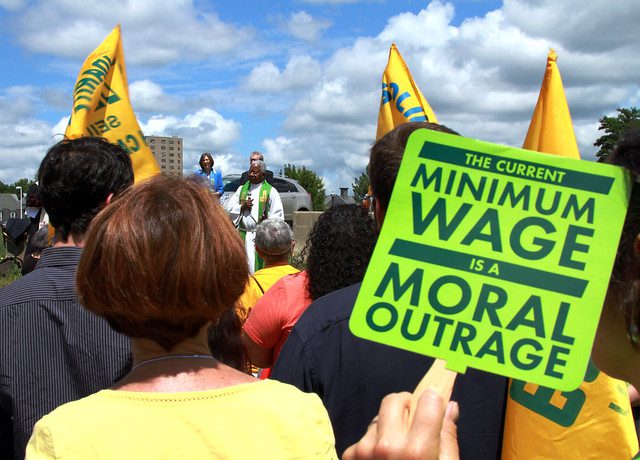
Palmer Park, Detroit Monday night group ride, 2013. Photo by Russ via flickr, CC BY 2.0
Are they backing down on work requirements and rent increases, or aren’t they? This administration just can’t keep its story straight. HUD Secretary Ben Carson recently doubled down on the department’s proposal to triple the rents of some people who receive housing assistance, despite previously backing down from the rent hikes. It’s estimated that 470,000 people would be affected by the change, but of course, Carson doesn’t think that’s many people at all. He’s so out of touch. If you have the stomach to watch Carson testify, watch the full webcast for more about the rent increase, work requirements, and the scaling back of fair housing requirements.
While we’re on the topic of housing assistance, a new report from the Children’s Defense Fund has found that 2.2 million children would no longer be in poverty if housing subsidies were expanded. Even more dramatic is this: Childhood poverty could be reduced by 60 percent if officials were to invest an additional 2 percent in nine existing programs, including child care subsidies, SNAP, and the minimum wage.
Housing advocates in Louisiana used data from the National Equity Atlas in their campaigns for two recent policy wins—a ban on new whole house short-term rentals in New Orleans, which has been suffering a major loss of affordable housing supply from tourist rentals, and the defeat of an attempt to prohibit inclusionary zoning at the state level. Numbers + stories are a winning combination!
Based on an assessment of New York City’s public housing by the city conducted in 2016 and 2017, over $31 billion is needed over the next five years to address unmet capital needs. This figure doesn’t even come close to what the public housing entity currently receives in federal, state, and municipal funds, and the amount will only increase—and the situation will only become more dire—if repairs and renovations go unaddressed. Also this week: a warning from the nonprofit Citizens Budget Commission that many NYCHA units are so dilapidated that by 2027 simple repair of them will not even be cost effective (this method of “removal by neglect” is not unfamiliar to our federal government).
Seattle has built a lot of new luxury apartments downtown, enough to slow rent increases a little bit and cause panicked developers to start offering free rent, no deposits, and massive gift cards to entice people to fill their vacant apartments. We know of a couple thousand folks on the streets of the city who need a place to live. . .
A major study of transportation in Los Angeles finds that ride-hail services like Lyft and Uber are providing more reliable access to low-income communities than traditional taxi services. Our familiarity with decades of stories of “hailing while Black” makes these findings unsurprising, but the study notes that disparities along racial lines still exist for ride-hail services. On the driver side, New York City may become the first city in the country to impose a minimum wage ($17.22) for ride-hail drivers. The proposal is part of a package put forth as a result of a study and subsequent report’s suggestions for making the industry more equitable for drivers.
FEMA was set to evict nearly 2,000 Hurricane Maria evacuees, but a judge has twice halted the action after a lawsuit was filed against the federal agency. The judge said storm victims were entitled to a reasonable notice of termination of their temporary housing assistance, and he pointed out that “in previous, equivalent disasters, FEMA extended the temporary housing assistance much longer than in the present disaster.” Of course it did. This is just another reason why people contend that the U.S. government doesn’t care about Puerto Ricans.
With so many crises affecting the country right now, attracting attention to a national level campaign must feel like a heavy lift. But the National Community Reinvestment Coalition is taking a good stab at it with its #TreasureCRA campaign—tapping into Americans’ desire for a more fair financial system. With the slogan “We need to modernize CRA, not relax it,” the campaign is gearing up to protect the landmark fair lending law from attacks by the never-met-a-regulation-I-liked-except-if-it-lined-my-own-pocket crowd.
In case we needed a reminder of how low we can go (we know, none of us do), the state dismissal of a Michigan case brought forth by students claiming that it was failing to provide them with a quality education was upheld by U.S. District Court judge Stephen J. Murphy. Murphy noted that no court rulings have established students right to have literacy taught to them. It is ironic that good jobs and jobs of the future require more literacy than ever before, so what have we prepared these students for?
This piece from Detroit revitalization news website Model D on the grassroots-led transformation of a local park made us smile. Palmer Park, which according to the author is still a work in progress, was taken under the wing of local community groups (including a walking group early on) who formed a nonprofit and have undertaken physical improvements to the park, and brought cultural events, a garden program, and health and wellness and youth activities. The park itself is unique because of its shape and location—accessible on all sides to several diverse neighborhoods, which helps facilitate interaction. More improvements are planned, and a grant from the Kresge Foundation aims to improve landscaping in order to make more parts of the park accessible.





Comments